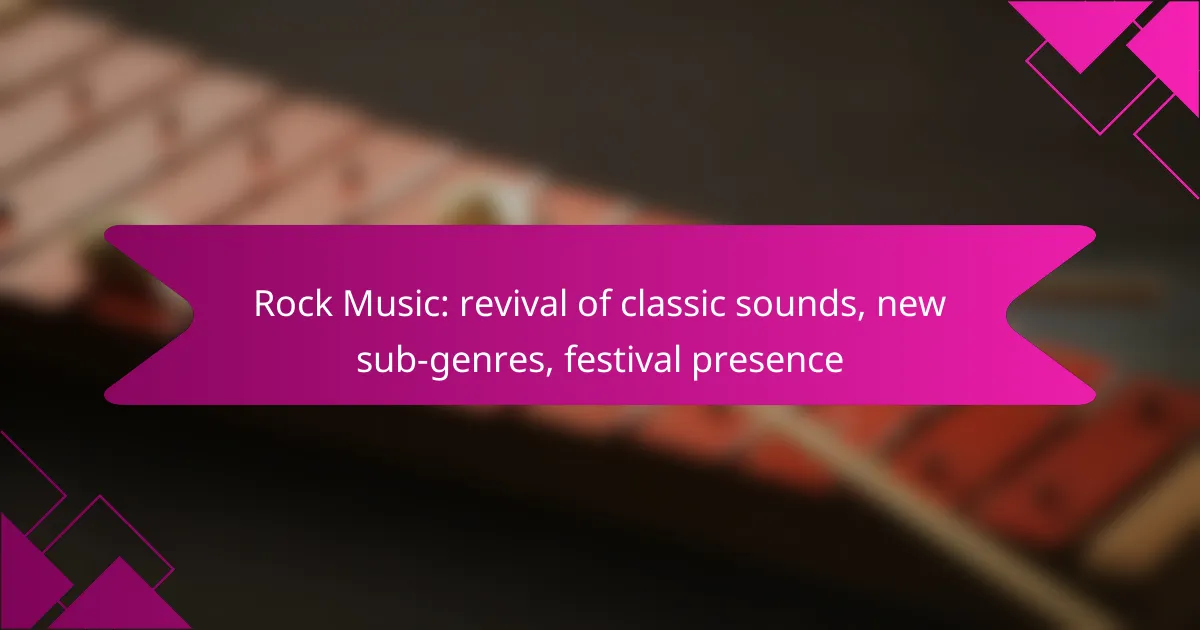Rock music is undergoing a vibrant revival, blending classic sounds with modern influences and introducing them to new audiences. This resurgence is marked by the emergence of innovative sub-genres that incorporate diverse elements, enriching the genre’s landscape. Festivals play a pivotal role in this evolution, offering platforms for both established and emerging artists to collaborate and showcase their unique styles.
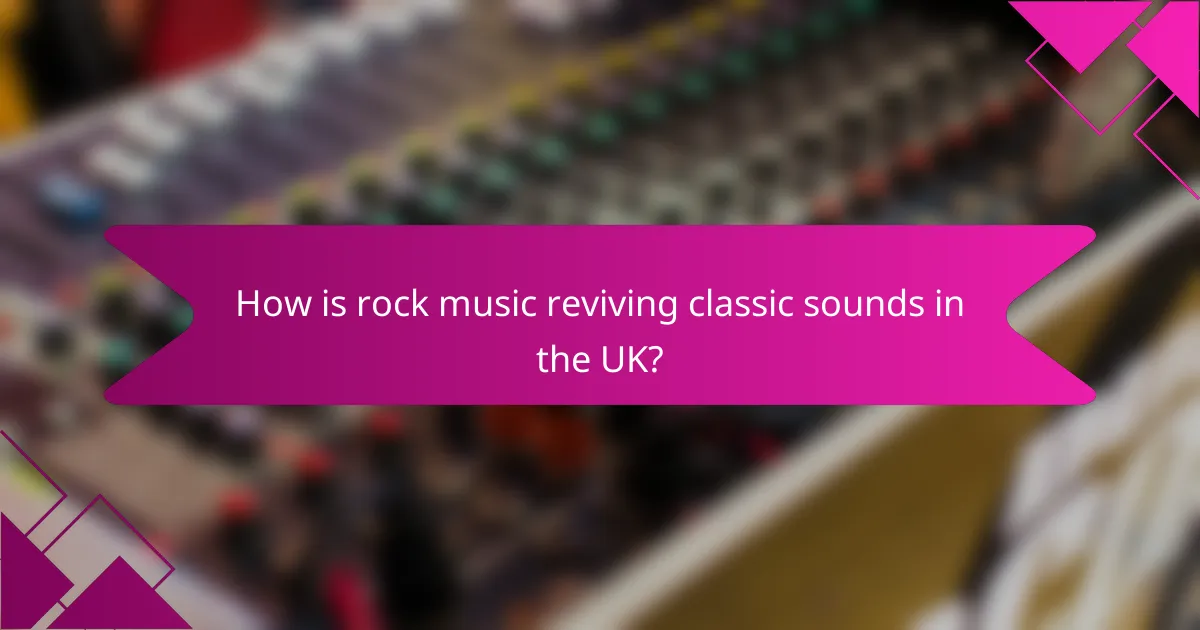
How is rock music reviving classic sounds in the UK?
Rock music in the UK is experiencing a revival of classic sounds through the influence of iconic bands, the rise of tribute acts, and the use of vintage instruments. This resurgence not only pays homage to the past but also introduces these classic elements to new audiences.
Influence of classic rock bands
Classic rock bands like The Rolling Stones, Led Zeppelin, and Pink Floyd continue to inspire contemporary musicians in the UK. Their songwriting, guitar riffs, and stage presence serve as blueprints for new artists seeking to capture that timeless rock essence. Many current bands incorporate similar musical structures and themes, creating a bridge between eras.
Additionally, classic rock festivals celebrate these legendary acts, drawing large crowds and fostering a sense of community among fans. Events like the Isle of Wight Festival often feature both tribute acts and original bands influenced by these rock pioneers.
Emergence of tribute bands
Tribute bands have become a significant part of the UK music scene, performing the hits of classic rock legends with impressive accuracy. These bands not only entertain but also educate younger audiences about the music that shaped rock history. Venues across the UK frequently host tribute nights, making classic rock accessible to fans of all ages.
Some tribute bands even tour extensively, drawing large audiences and generating substantial revenue. This trend highlights the enduring popularity of classic rock and its ability to connect generations through music.
Use of vintage instruments
The revival of classic sounds in rock music is also evident in the use of vintage instruments. Many contemporary bands are opting for guitars, amplifiers, and drums that were popular in the 60s and 70s, which contributes to an authentic sound. Instruments like Fender Stratocasters and Gibson Les Pauls are frequently seen on stage, enhancing the nostalgic experience for fans.
Moreover, the resurgence of vinyl records has led to a renewed interest in analog recording techniques, further emphasizing the classic rock aesthetic. Musicians are increasingly turning to vintage gear to achieve that warm, rich sound that defined the genre.
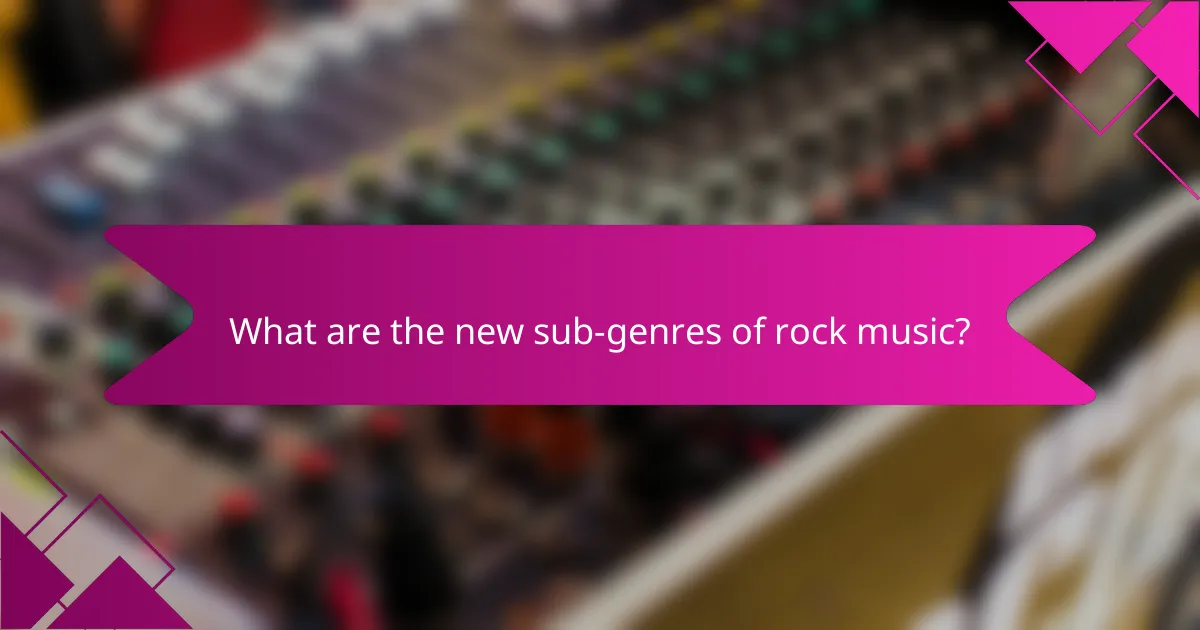
What are the new sub-genres of rock music?
New sub-genres of rock music have emerged, reflecting a blend of traditional sounds with contemporary influences. These styles often incorporate elements from various genres, appealing to diverse audiences and revitalizing the rock scene.
Alternative rock evolution
Alternative rock has evolved significantly, branching into various styles that include indie rock, grunge, and shoegaze. This evolution allows for a wide range of sounds, from melodic and introspective to raw and aggressive, often characterized by unconventional song structures and lyrical themes.
Artists like Tame Impala and Arctic Monkeys exemplify this evolution, blending rock with electronic and pop influences. The genre continues to attract new listeners, making it a vital part of the modern music landscape.
Folk rock resurgence
The resurgence of folk rock has brought acoustic instruments and storytelling back to the forefront of rock music. This sub-genre often features a mix of traditional folk melodies with rock rhythms, creating a sound that is both nostalgic and fresh.
Contemporary artists such as Mumford & Sons and The Lumineers have popularized this revival, often incorporating harmonies and instrumentation that evoke a sense of community. Festivals frequently showcase these acts, highlighting the genre’s growing popularity.
Post-punk revival
The post-punk revival has reinvigorated the genre with a focus on experimental sounds and a DIY ethos. Bands like Interpol and The Strokes have drawn inspiration from the late 1970s and early 1980s, blending punk’s raw energy with new wave’s melodic sensibilities.
This revival emphasizes rhythm and texture, often featuring angular guitar riffs and introspective lyrics. The movement has led to a resurgence of underground scenes, with many local venues hosting emerging post-punk bands, fostering a sense of innovation and community in rock music.
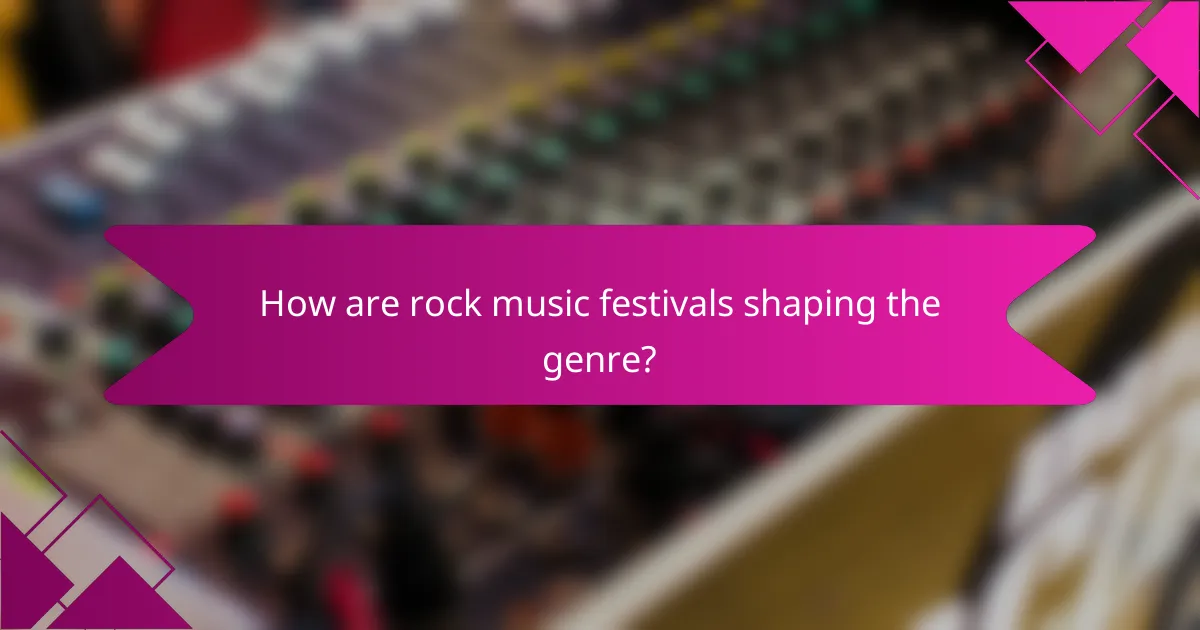
How are rock music festivals shaping the genre?
Rock music festivals are crucial in shaping the genre by providing platforms for both established and emerging artists, fostering collaboration, and reviving classic sounds. These events create a vibrant environment where diverse rock sub-genres can flourish and evolve, influencing trends and audience preferences.
Major UK festivals featuring rock
The UK hosts several prominent rock music festivals that highlight both classic and contemporary acts. Festivals such as Glastonbury, Download, and Reading & Leeds attract large crowds and feature a mix of legendary bands and new talent. These events often showcase a variety of rock sub-genres, from indie and punk to metal and alternative.
Glastonbury, for instance, is known for its eclectic lineup, while Download focuses primarily on rock and heavy metal, making each festival unique in its offerings. Attendees can expect to see performances from iconic bands as well as up-and-coming artists, creating a rich tapestry of rock music.
Impact of festivals on new artists
Rock festivals significantly impact new artists by providing them with exposure to large audiences and industry professionals. Performing at these events can lead to increased visibility, potential record deals, and opportunities for touring. Many new bands use festivals as a launching pad for their careers, often gaining a loyal fan base in the process.
Additionally, festivals often include stages dedicated to emerging artists, allowing them to share the spotlight with established acts. This exposure can be crucial for building a career in the competitive music industry, as many attendees discover new favorites at these events.
Festival collaborations with classic acts
Collaborations between new artists and classic rock acts at festivals are becoming increasingly common. These partnerships not only attract fans of the legendary bands but also introduce younger audiences to classic sounds. Such collaborations can take the form of joint performances, special guest appearances, or even co-headlining slots.
For example, festivals may feature a classic band performing alongside a rising star, creating a unique blend of old and new rock music. These collaborations can enhance the festival experience, offering fans a chance to witness the evolution of rock music firsthand while celebrating its rich history.
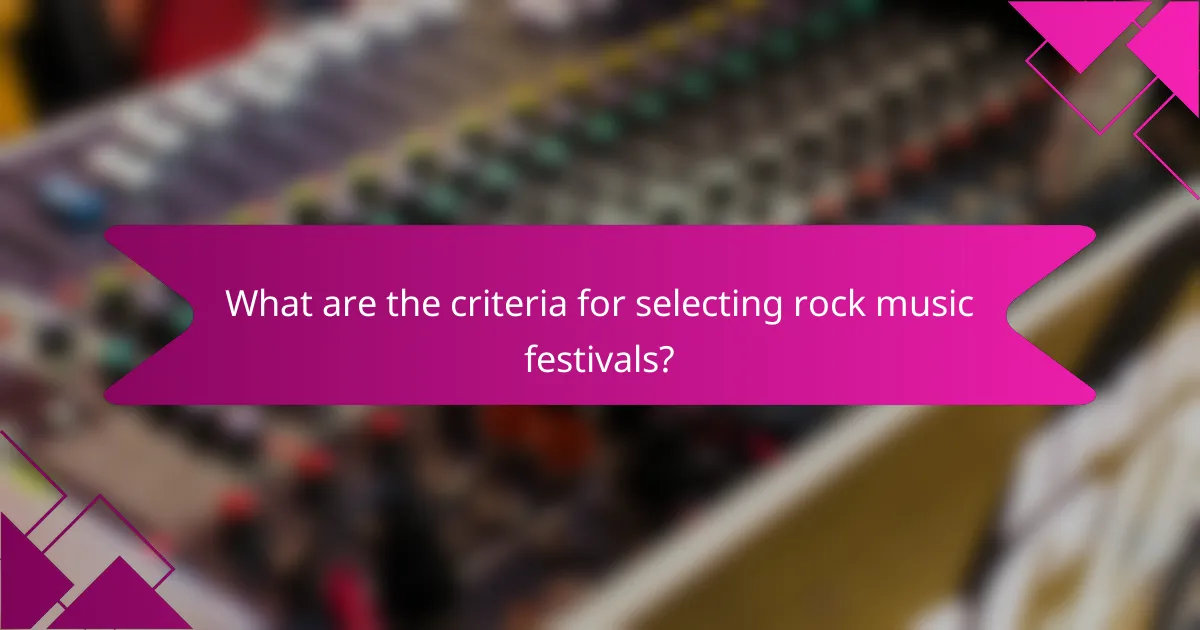
What are the criteria for selecting rock music festivals?
Selecting rock music festivals involves evaluating several key criteria that can enhance the overall experience. Important factors include lineup diversity, location and accessibility, and the festival’s reputation and history.
Lineup diversity
Lineup diversity is crucial for attracting a wide audience and providing varied musical experiences. Festivals that feature a mix of established artists, emerging bands, and different rock sub-genres tend to draw larger crowds. Look for festivals that showcase a range of styles, from classic rock to punk, indie, and metal.
Consider the balance between headliners and smaller acts. A good festival often includes a few big names alongside lesser-known performers, which can create a more dynamic atmosphere and introduce attendees to new music.
Location and accessibility
The location and accessibility of a rock music festival significantly impact attendance and enjoyment. Festivals situated in urban areas or near major transport links are generally more accessible, making it easier for fans to attend. Check for nearby accommodations, parking options, and public transport availability.
Additionally, consider the festival’s setting. Outdoor venues can enhance the experience, but ensure they have adequate facilities like restrooms and food vendors. Festivals in scenic locations may offer added appeal, but accessibility should remain a priority.
Festival reputation and history
A festival’s reputation and history can provide insights into what to expect. Established festivals with a strong track record often attract high-quality acts and have better organization. Research past lineups and attendee reviews to gauge the festival’s reliability and overall vibe.
Newer festivals can also be worth exploring, especially if they focus on niche genres or unique experiences. However, be cautious and check for reviews or testimonials from previous attendees to avoid potential disappointments.
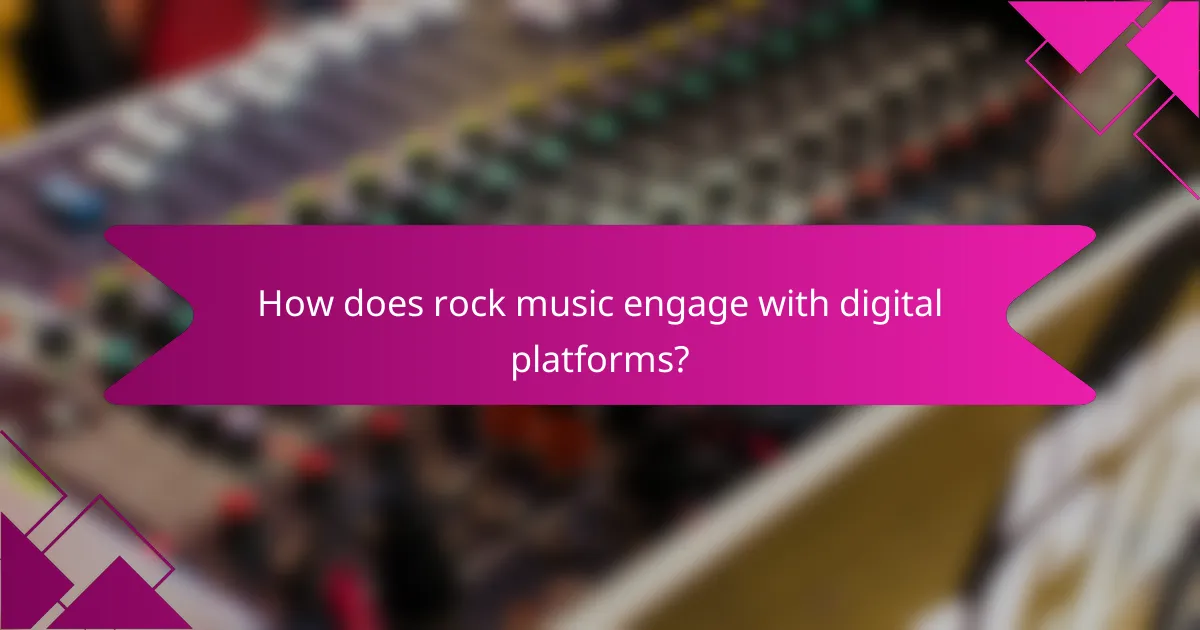
How does rock music engage with digital platforms?
Rock music engages with digital platforms primarily through streaming services, social media, and online fan communities. These platforms enable artists to reach wider audiences, promote their music, and interact with fans in innovative ways.
Streaming services promoting new rock
Streaming services like Spotify, Apple Music, and YouTube have become essential for promoting new rock music. These platforms offer curated playlists that can significantly boost an artist’s visibility, often leading to increased streams and downloads.
Many emerging rock bands utilize these services to distribute their music without the need for traditional record labels. This democratization allows for a diverse range of sounds and styles to flourish, from classic rock revivals to experimental sub-genres.
Social media influence on rock artists
Social media platforms such as Instagram, Twitter, and TikTok play a crucial role in shaping the careers of rock artists. Musicians can share updates, engage with fans, and promote new releases directly, creating a more personal connection.
Artists often use social media to showcase their creative processes, behind-the-scenes content, or even live performances, which can enhance their appeal. Engaging with trending topics or challenges can also help them reach new audiences.
Online fan communities
Online fan communities, including forums and social media groups, provide a space for rock enthusiasts to connect and share their passion. These communities often discuss new releases, concert experiences, and band news, fostering a sense of belonging among fans.
Platforms like Reddit and Discord host dedicated channels where fans can interact, share music recommendations, and even organize meetups. This engagement not only strengthens fan loyalty but also helps artists gauge their audience’s preferences and feedback.
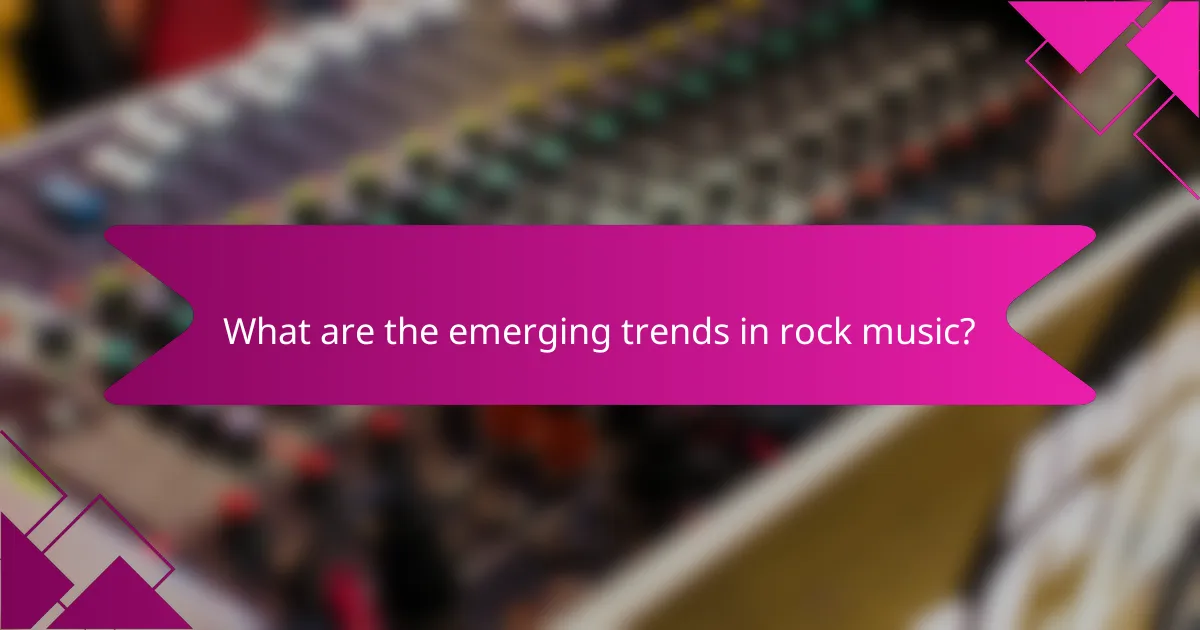
What are the emerging trends in rock music?
Emerging trends in rock music include a revival of classic sounds, the rise of new sub-genres, and an increased presence at music festivals. These trends reflect a blend of nostalgia and innovation, appealing to both long-time fans and new listeners.
Revival of classic sounds
The revival of classic rock sounds is characterized by modern bands drawing inspiration from iconic artists of the past. This trend often incorporates vintage instruments and production techniques, creating a familiar yet fresh listening experience. Bands like Greta Van Fleet and The Struts exemplify this movement, channeling the spirit of 70s rock while appealing to contemporary audiences.
Listeners are increasingly drawn to this nostalgic sound, which evokes memories of classic rock legends. This trend not only celebrates the genre’s history but also introduces it to younger generations, ensuring its longevity.
New sub-genres
New sub-genres in rock music are emerging as artists experiment with different styles and influences. Genres such as punk rock revival, indie rock, and post-rock are gaining traction, each bringing unique elements to the rock landscape. For instance, bands like Wolf Alice and Royal Blood blend rock with electronic and alternative influences, creating a diverse sound palette.
This diversification allows for greater creativity and expression in rock music, attracting a wider audience. Fans can explore various sub-genres that resonate with their tastes, fostering a dynamic music scene.
Festival presence
Rock music’s presence at festivals has seen a resurgence, with many events featuring a mix of classic and contemporary rock acts. Major festivals like Coachella and Glastonbury have dedicated stages for rock artists, showcasing both established bands and emerging talent. This trend highlights the genre’s enduring popularity and ability to draw large crowds.
Festival-goers often seek a blend of nostalgia and new experiences, making rock music a staple at these events. As festivals evolve, they continue to provide a platform for rock musicians to connect with fans and gain exposure in an increasingly competitive music landscape.
